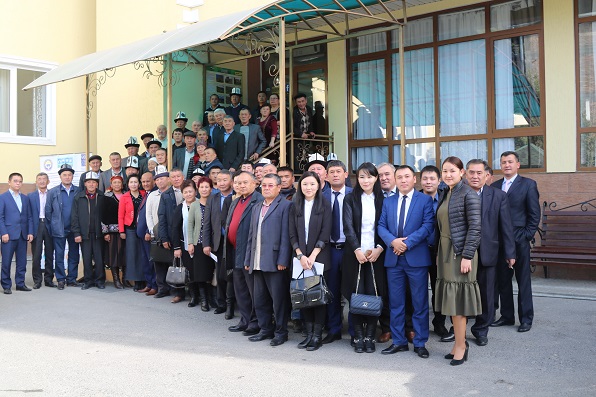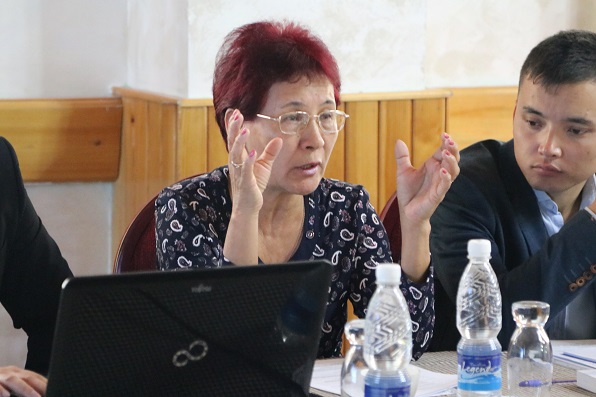News block
Public hearings on good water supply
In the end of October and beginning of November, Kyrgyzstan held public hearings on drafts bylaws entitled “Strengthening control over safe and quality water, water supply and sanitation facilities”.
Vladimir Grebnev, the Coordinator of UNDP “Environment Protection for Sustainable Development” Programme, emphasizes the importance of these public hearings held in both the south and north of the country. “We got opinions and suggestions from all oblasts of the republic,” he said. The public hearings involved the representative of the Department of Disease Prevention and State Sanitary and Epidemiological Surveillance of Kyrgyzstan Ministry of Health (DDPSSES) including its territorial units from Osh, Jalal-Abad, Batken, Chui and Issyk-Kul oblasts, government officials, members of Rural Public Associations of Drinking Water Consumers and representatives of civil society.
They considered four draft bylaws developed by DDPSSES under support of GoAL WaSH project:
- Sanitation Regulations on Sanitary Safety of Polymer Materials Used in Water Supply Systems;
- Methodological Instructions “Sanitary and Epidemiological Control over Water Supply Systems with use of UV technology in Drinking Water Preparation Process;
- Sanitary and Epidemiological Regulations on Sanitary and Epidemiological Requirements for Safe Hot Water Supply;
- Sanitary Rules on Construction and Maintenance of Public Convenience.
Doctor of Common Hygiene of DDPSSES, Saryeva Gulnara, says water microbiologic indicator does not meet water standards up to 18% and even up to 33 % in some districts of the country. She says this is very high difference and indicate to possible enteric infection episodes. “The current regulations under the supervision of the Center of State Sanitation and Epidemiological Surveillance (CSSES) have only character of recommendation that does not allow controlling water quality and safety together with water supply and sanitation facilities,” she says. “We need bylaws having full force and effect. This will allow us to control over quality of water and to demand compliance with sanitary and hygiene standards. Meanwhile, the country never had regulations on UV technologies for drinking water preparation. We are doing this for the first time and public hearings are very important for us.”
Kyrgyzstan has complex legislation on drinking water supply comprising demands on water safety but these demands do not have mechanisms for implementation, believes Arykbaeva Bubudjan, the head of department of DDPSSES. Almas Tashpaev, the head of the Department of Surveillance of Water Resources and Facilities under the State Inspection Office for Environmental and Technical Safety under Kyrgyzstan Government, agrees with her. “Considered bylaws concretize functions, actions and responsibility of relevant government agencies, local self-government authorities and regulatory agencies for drinking water supply,” he said.
Bishkek CSSES Sanitary Physician, Saparov Daniar, highlights importance of validation of sanitary and hygiene standards, in particular sanitation standards for construction and maintenance of public conveniences. “Before we have no any documents on this but now such document is being developed,” he says.
Public hearings participants showed lively interest in UV technologies as innovative and environmentally friendly method of water treatment. They delved into quality standards for polymers and discussed the issue of plastic materials recycling in Kyrgyzstan with their further use in water supply systems. The official of Bishkek Water Service, Zhilenko Svetlana, stressed the importance of validation of standards for supplied materials. “It is very important for us that we are working out requirements for suppliers; and we together with supervisory authorities and suppliers may read these documents clearly, avoiding variant readings.”
Mihailenko Daima, the official of Bishkek Cogeneration, raised the issue on validation of technical standards for safe hot water supply.
All participants of public hearings are unanimous in their opinion, the role of UNDP “Environment Protection for Sustainable Development” Programme (phase 2 of GoAL WaSH sub-project) is invaluable in analysis of legislation on drinking water supply and sewerage. “Currently, GoAL WaSH project made analysis of all regulatory and legal acts and provided recommendations to Kyrgyzstan in accordance with its results,” Almas Tashpaev said. Zhilenko Svetlana stressed the facilitating and organizational role of the project. “Prior to agreement on a bill, we must develop an analysis of the regulatory impact, hold public hearings, and this is exactly what UNDP is helping us to do.”
Arykbaeva Bubudjan says they are planning to submit these bylaws to Kyrgyzstan Government for consideration by end of this year.
The public hearings were organized by DDPSSES together with public fund “Alliance of Youth” under support of UNDP “Environment Protection for Sustainable Development” Programme”.
Additional information is available at Vladimir Grebnev, the Coordinator of UNDP “Environment Protection for Sustainable Development” Programme in Kyrgyzstan, tel. + 996-312 304140 (ext. 172), mobile +996-777 909110, e-mail vladimir.grebnev@undp.org

